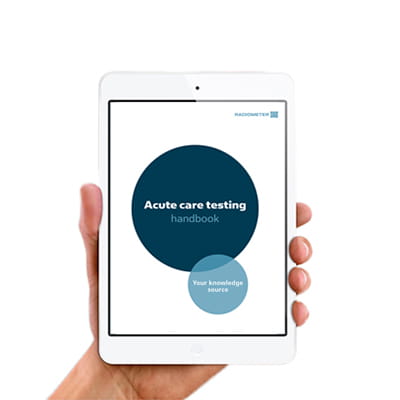Printed from acutecaretesting.org
August 2016
Alcoholic ketoacidosis – a case report
Summarized from Noor N, Basavaraju K, Sharpstone D. Alcoholic ketoacidosis: a case report and review of the literature. Oxford Medical Case Reports 2016; 3: 31-33
Three parameters generated during blood gas analysis, pH, pCO2 and bicarbonate, provide the means for assessment of patient acid-base status, which is frequently disturbed in the acutely/critically ill.
Four broad classes of acid-base disturbance are recognized: metabolic acidosis, respiratory acidosis, metabolic alkalosis and respiratory alkalosis.
Metabolic acidosis, which is characterized by primary reduction in pH and bicarbonate, and secondary (compensatory) decrease in pCO2, has many possible causes including the abnormal accumulation of the keto-acids, β-hydroxybutyrate and acetoacetate.
This particular form of metabolic acidosis, called ketoacidosis, has three etiologies giving rise to three quite separate conditions with common biochemical features: diabetes (diabetic ketoacidosis); excessive alcohol ingestion (alcoholic ketoacidosis) and severe starvation (starvation ketoacidosis).
Diabetic ketoacidosis, which is the most common of the three, is the subject of a recent review (discussed below) whilst alcoholic ketoacidosis is the focus of this recent case study report.
The case concerns a 64-year-old lady who presented to the emergency department of her local hospital with acute-onset abdominal pain, nausea, vomiting and shortness of breath.
Blood gas results (pH 7.10, bicarbonate 2.9 mmol/L) confirmed metabolic acidosis, and the presence of raised ketones (serum ketones 5.5 mmol/L) allowed a diagnosis of ketoacidosis.
Initially, doctors caring for the patient entertained the possibility that the lady was suffering diabetic ketoacidosis, but her normal blood glucose concentration (5.8 mmol/L) and preserved mental status suggested this was unlikely.
A diagnosis of alcoholic ketoacidosis was finally made when she reported drinking 1-2 bottles of wine per day for the past 30 years, and admitted to a period of binge drinking immediately prior to the onset of symptoms and subsequent admission to hospital.
(A period of binge drinking without food, limited by onset of vomiting and abdominal pain, on a background of chronic alcohol excess is the usual presentation of alcoholic ketoacidosis.)
Following timely fluid resuscitation and nutritional support the lady made a full recovery from what is a potentially life-threatening condition. In discussion of the case history the authors explain the multifactorial nature of the acidosis that develops in those with alcoholic ketoacidosis.
They discuss the differential diagnosis for patients presenting with ketoacidosis, paying particular attention to the features that distinguish diabetic ketoacidosis and alcoholic ketoacidosis.
The authors emphasize that correct diagnosis is essential because treatment of diabetic ketoacidosis involves insulin administration, a totally inappropriate treatment for those with alcoholic ketoacidosis.
Administration of insulin to those with alcoholic ketoacidosis, who usually have normal or reduced blood glucose, could well precipitate life-threatening hypoglycemia.
May contain information that is not supported by performance and intended use claims of Radiometer's products. See also Legal info.
Acute care testing handbook
Get the acute care testing handbook
Your practical guide to critical parameters in acute care testing.
Download nowRelated webinar
Evolution of blood gas testing Part 1
Presented by Ellis Jacobs, PhD, Assoc. Professor of Pathology, NYU School of Medicine.
Watch the webinar







